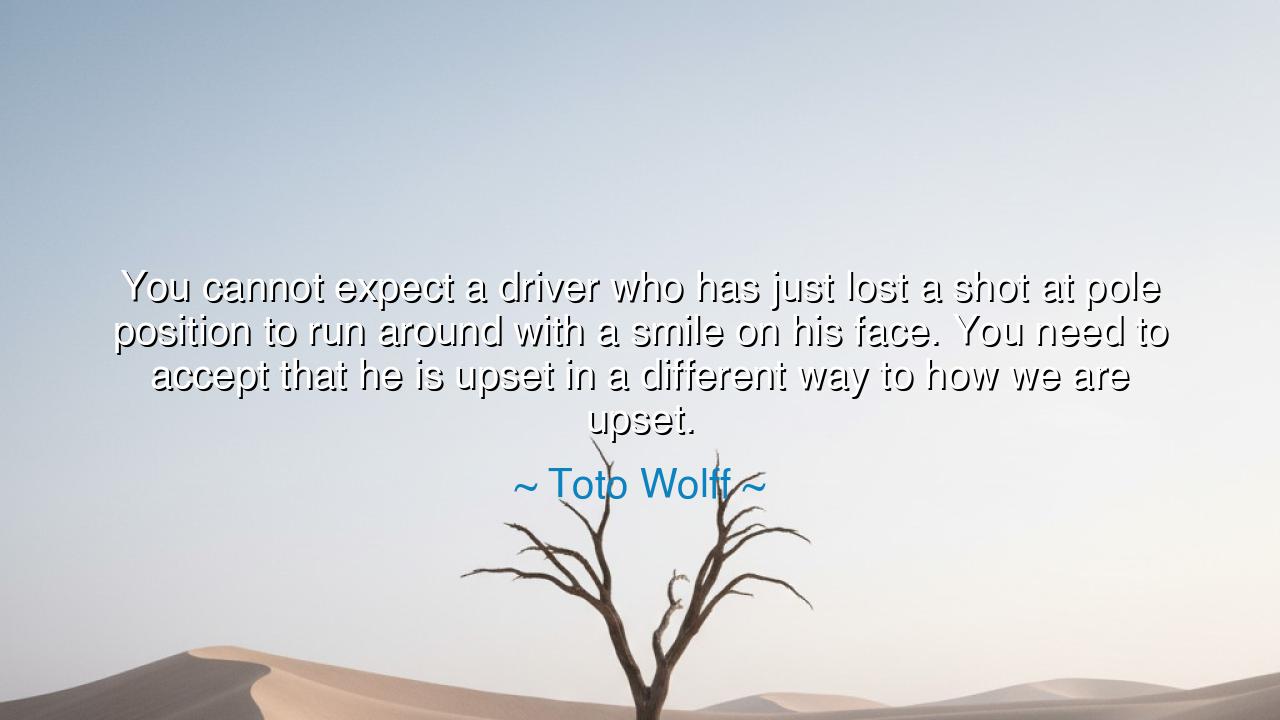
You cannot expect a driver who has just lost a shot at pole
You cannot expect a driver who has just lost a shot at pole position to run around with a smile on his face. You need to accept that he is upset in a different way to how we are upset.






Hear now the words of Toto Wolff, master of the paddock and steward of champions, who spoke with the clarity of one who has seen both triumph and despair: “You cannot expect a driver who has just lost a shot at pole position to run around with a smile on his face. You need to accept that he is upset in a different way to how we are upset.” Though spoken of the racing world, these words strike deeper than sport, carrying wisdom about empathy, perspective, and the dignity of human emotion. They remind us that to truly understand another, we must honor the uniqueness of their struggle and the form of their pain.
The meaning of this truth lies in the nature of expectation. The crowd, the team, even the casual observer may demand a smile, a gracious face, even in the shadow of bitter disappointment. But the warrior of the track, whose life is measured in fractions of seconds and whose labor is consumed by pursuit of perfection, cannot mask his sorrow so easily. Wolff teaches us that we must not impose our own measures of upset upon others, for their pain is shaped by their path, their devotion, and their sacrifice. To accept this is not weakness, but wisdom.
History, too, offers examples of this truth. Recall Achilles, the mightiest of the Greeks, who withdrew in wrath after being dishonored by Agamemnon. To the soldiers, his reaction may have seemed excessive, yet to him, it was the wound of pride, the insult to his very soul. His upset was not theirs to judge, for they did not bear the same burden of honor. Just as Achilles’ grief and rage were born of who he was, so too is the driver’s sorrow at losing pole position born of years of struggle, of relentless pursuit, of dreams balanced on a razor’s edge.
And consider also Abraham Lincoln, who, though mocked for his melancholy, carried within himself the weight of a fractured nation. To his peers, his sorrow seemed strange, even unnecessary. But Lincoln’s upset was born of vision and responsibility greater than theirs. In this way, Wolff’s words echo across time: do not measure another’s grief with your own scale, for the weight they carry is not the weight upon your shoulders.
There is heroism in allowing others their emotions. To demand a smile in the face of loss is to strip a man of his humanity, to deny him the right to feel the truth of his heart. Wolff teaches us instead to grant space, to honor authenticity. The driver who lowers his head after defeat is not weak, but honest. His silence, his visible upset, is itself the measure of his passion, the proof that he has given everything. In honoring this, we honor the spirit of competition itself.
The lesson for us, O seekers, is this: learn to see beyond appearances. Do not demand constant smiles from those around you, for their struggles may run deeper than you know. Accept differences in sorrow, recognizing that each heart is wounded in its own way. And in your own life, give yourself permission to feel the depth of your disappointment, for in that authenticity lies strength. Suppressed sorrow becomes poison; expressed sorrow becomes healing.
Therefore, let each one act thus: be compassionate in judgment, remembering that what seems small to you may be vast to another. Allow space for grief and anger, for these are as much a part of the human journey as joy. And above all, do not demand false smiles, but seek instead the truth of the heart, for only from truth can resilience rise again.
Thus, the teaching is eternal: A man’s smile is not always owed to the world, especially in moments of defeat. Respect his sorrow, for in that sorrow lies his passion. And know that by honoring another’s grief, you walk the path of wisdom, empathy, and strength.






AAdministratorAdministrator
Welcome, honored guests. Please leave a comment, we will respond soon